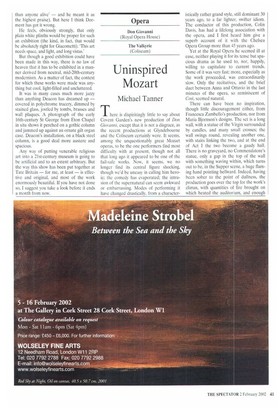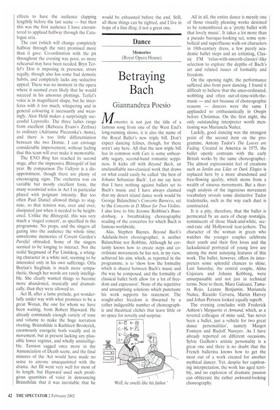Don Giovanni (Royal Opera House) The Valkyrie (Coliseum)
Uninspired Mozart
Michael Tanner
There is dispiritingly little to say about Covent Garden's new production of Don Giovanni, except that it is not a disgrace, as the recent productions at Glyndebourne and the Coliseum certainly were. It seems, among the unquestionably great Mozart operas, to be the one performers find most difficulty with at present, though not all that long ago it appeared to be one of the fail-safe works. Now, it seems, we no longer find its central figure shocking, though we'd be uneasy in calling him heroic; the comedy has evaporated; the intrusion of the supernatural can seem awkward or embarrassing. Modes of performing it have changed drastically. from a character
istically rather grand style, still dominant 30 years ago, to a far lighter, swifter idiom. The conductor of this production, Colin Davis, has had a lifelong association with the opera, and I first heard him give a superb account of it with the Chelsea Opera Group more than 45 years ago.
Yet at the Royal Opera he seemed ill at ease, neither playing it for its tense but spacious drama as he used to, nor, happily, willing to capitulate to current trends. Some of it was very fast; more, especially as the work proceeded, was extraordinarily slow. Only the recitatives, and the brief duet between Anna and Ottavio in the last minutes of the opera, so reminiscent of Cosi, seemed natural.
There can have been no inspiration, though little discouragement either, from Francesca Zainbello's production, nor from Maria Bjornson's designs. The set is a long wall, with a statue of the Virgin surrounded by candles, and many small crosses; the wall swings round, revealing another one, with stairs linking the two, and at the end of Act I the two become a gaudy hall. There is no graveyard, no Commendatore's statue, only a gap in the top of the wall with something waving within, which turns out to be, in the Supper scene, a huge flaming hand pointing hellward. Indeed, having been sober to the point of dullness, the production goes over the top for the work's climax, with quantities of fire brought on which heated the auditorium, and enough effects to have the audience clapping lengthily before the last scene — but then this was the first audience I have encountered to applaud halfway through the Catalogue aria.
The cast (which will change completely halfway through the run) promised more than it gave. Co-ordination with the pit throughout the evening was poor, so more rehearsal may have been needed. Bryn Terfel's Don is imposing in presence, struts regally, though also has some bad demotic habits, and completely lacks any seductive appeal. There was no moment in the opera where it seemed even likely that he would succeed in his amorous plottings. Terfel's voice is in magnificent shape, but he interferes with it too much, whispering and in general colouring it incessantly and wearingly. Alan Held makes a surprisingly successful Leporello. The three ladies range from excellent (Rebecca Evans's Zerlina) to ordinary (Adrianne Pieczonka's Anna), and there is too little differentiation between the two Donne. I can envisage considerable improvement, without feeling that this team will ever make it memorable.
The ENO Ring has reached its second stage, after the impressive Rhinegold of last year. By comparison The Valkyrie is a disappointment, though there are plenty of encouraging signs. The orchestra was on variable but mostly excellent form, the many woodwind solos in Act I in particular played with poignant intensity. But too often Paul Daniel allowed things to stagnate, so that tension was, over and over, dissipated just when it needed to be heightened. Unlike the Rhinegold, this was very much a 'staged concert', as specified in the programme. No props, and the singers all gazing into the audience the whole time; unwelcome memories of Covent Garden's Parsifal obtruded. Some of the singers seemed to be longing to interact. Not the stolid Siegmund of Par Lindskog, a whinging character in a white suit, seeming to be interested only in his own sufferings. Orla Boylan's Sieglinde is much more sympathetic, though her words are rarely intelligible. She clearly wanted things to become more abandoned, musically and dramatically, than they were allowed to.
Act II, after a lame prelude, got wonderfully under way with what promises to be a great Wotan, the one for whom we have been waiting, from Robert Hayward. He already commands enough variety of tone and volume to make the huge narration riveting. Briinnhilde is Kathleen Broderick, enormously energetic both vocally and in movement, but at present lacking any plausible lower register, and wholly unintelligible. Tension sagged once more in the Annunciation of Death scene, and the final minutes of the Act would have made no sense to anyone unacquainted with the drama. Act III went very well for most of its length, but Hayward used such prodigious quantities of voice in denouncing Briinnhilde that it was inevitable that he
would be exhausted before the end. Still, all these things can be righted, and I live in hope of a fine Ring, if not a great one.































































 Previous page
Previous page